THAILAND: Rohingya asylum seekers arrested in southern provinces of Thailand
ISSUES: Refugees, IDPs and asylum seekers; human trafficking; minorities
Dear friends,
The Asian Human Rights Commission is deeply concerned for the fate of Rohingya asylum seekers who have been arrested in the past weeks in police sweeps of remote areas in Songkhla's Sadao district near the border with Malaysia and the other provinces. They have fled from Burma, where they have been subjected to various types of persecution.
Even though Rohingya migrants are entering into Thailand without permission, owing to well-founded fear of being persecuted for reasons of race and religion they are entitled to seek asylum. Therefore customary international law and the non-refoulement principle should be strictly applied by the Thai state.
CASE DETAILS:
Rohingya migrants have fled from Burma, where they have been subjected to various types of persecution. In Thailand, they have been arrested in the past weeks as police rounded up 397 Rohingya migrants at remote areas in rubber plantations in Songkhla's Sadao district near the border with Malaysia on January 10, 2013. As of January 31, the number of Rohingya reportedly arrested was 1486 persons.
On January 16, The Burmese Rohingya Association in Thailand submitted a petition to the National Human Rights Commission of Thailand seeking help for the detained Rohingya. NHRC member Niran Pitakwatchara said a sub-panel on civil and political rights would meet state agencies on January 28 to discuss the issue.
Meanwhile, Prime Minister Yingluck Shinawatra recently approved temporary assistance for a group of Rohingya until their status is determined, and the United Nations High Commissioner for Refugees is also trying to determine the peoples' status but a person shall be granted refugee status first, then he/she would be resettled later on.
On January 18, The Central Islamic Council of Thailand said it would propose the central mosque of Songkhla province be used as a main shelter for Muslim migrants who have not been charged with any criminal offences. The Council also encouraged Muslim nations, international organisations and the UN agencies on human rights to discuss with a third country the possibility of granting asylum to the Rohingya migrants.
But, on January 21, the National Security Council insisted that the detained Rohingya should be classed as illegal immigrants, not refugees. Meantime, police have been arresting people alleged to have brought the Rohingya into Thailand, and have been examining the role of human trafficking agencies.
On January 31, the government decided to take care of the Rohingya for six months. The male Rohingya asylum seekers were being detained at the Immigration Bureau while women and children were staying at the Ministry of Social Development and Human Security's shelters for children and women.
For further analysis of the legal status under law on Immigration of these persons in Thailand, please see the sample letter, below.
Background Information:
Even though Rohingya migrants entering into Thailand under domestic law could be removed from the territory, because they are seeking asylum in accordance with the terms of the 1951 Convention Relating to the Status of Refugees, and because many of them are stateless persons, the government of Thailand has an obligation to recognise their claims and make necessary arrangements to accommodate them until such a time as they can return to Burma safely or go to a third country. These obligations apply under international customary law irrespective of the fact that Thailand has not ratified the 1951 Convention.
Rohingya from western Burma have since the 1970s been subject to systematic programs for their removal from the country or for their economic and political marginalisation, through denial of access to travel documents, effectively prohibiting them from enjoying rights to education, health, movement and employment that other people in the country have. Since the mid-2000s, increasing numbers have come to Thailand, sometimes on their way to Malaysia or Indonesia, where authorities have treated them with hostility, on some occasions reportedly towing boats that have attempted to land back out to sea.
The most recent arrivals have fled following violence in mid-2012 and October 2012, during which entire urban communities and villages were allegedly razed through fire by members of indigenous communities, claiming that the Rohingya have no legitimate claim to reside as an ethnic minority in Burma. Claims that the persons responsible for attacks were backed by government officials are credible given the longstanding and blatant anti-Rohingya position taken by the government in Burma and its personnel, but are difficult to prove given the current conditions in the region, which remains under a state of emergency.
SUGGESTED ACTION:
Please write letters to the authorities listed below, urging them to assist Rohingya asylum seekers, not treat them as illegal immigrants. Please note that for the purposes of this letter, Burma is referred to by its official name as Myanmar.
Please be informed that the AHRC is writing separate letters to the UN Special Rapporteurs on trafficking in persons, on the human rights of internally displaced persons, on human rights in Myanmar, and to the human rights office in Bangkok, calling for urgent intervention into this matter.
SAMPLE LETTER:
Dear -----,
THAILAND: Rohingya asylum seekers arrested in southern provinces of Thailand
I am writing to you to call for urgent intervention into the case of Rohingya migrants who have fled from Myanmar, where they have been subjected to various types of persecution. In Thailand, they have been arrested in the past weeks as they have arrived in the county's south. According to the information I have received, as of January 31, a total of 1486 Rohingya had been taken into custody. [More recenly the number was given as 1752.]
On January 16, The Burmese Rohingya Association in Thailand submitted a petition to the National Human Rights Commission of Thailand seeking help for the detained Rohingya. NHRC member Niran Pitakwatchara said a sub-panel on civilian and political rights would meet state agencies on January 28 to discuss the issue.
Meanwhile, Prime Minister Yingluck Shinawatra recently approved temporary assistance for a group of Rohingya until their status is determined, and the United Nations High Commissioner for Refugees is also trying to determine the people's status but a person shall be granted refugee status first, then he/she would be resettled later on.
On January 18, The Central Islamic Council of Thailand said it would propose the central mosque of Songkhla province be used as a main shelter for Muslim migrants who have not been charged with any criminal offences. The Council also encouraged Muslim nations, international organisations and the United Nations agencies on human rights to discuss with a third-party country the possibility of granting asylum to the Rohingya migrants.
But, on January 21, the National Security Council insisted that the detained Rohingya should be classed as illegal immigrants, not refugees. Meantime, police have been arresting people alleged to have brought the Rohingya into Thailand, and have been examining the role of human trafficking agencies.
On January 31, the government had decided to take care of the illegal Rohingya migrants for six months. The male Rohingya migrants were being detained at the Immigration Bureau while women and children were staying at the Ministry of Social Development and Human Security's shelters for children and women.
In this context, I want to take this opportunity to express my concern about law enforcement under Immigration Act B.E.2522 (1979). Clearly, the Rohingya are not Thai nationals and have entered Thailand as aliens, in accordance with section 4 of the Act. They having no genuine and valid passport or document used in lieu of passport, and therefore under section 58 their migration into Thailand is illegal.
According to section 19, ''In inspecting and considering whether as alien is forbidden from entering the Kingdom, the competent officer shall have authority to allow said alien to stay at an appropriate place after promising that he will present himself to the competent officer to received his orders on a specified date, time and place; or if the competent officer deems appropriate he may call for bond or call for both bond and security; or the competent officer may detain aliens at any place.'' It is in accordance with this section that the people have now been detained.
Notwithstanding, because Rohingya migrants entered Thailand because of a well-founded fear of being persecuted for reasons of race, religion and nationality in Myanmar, the Council of Ministers may consider a special exemption under section 17 of the act.
Accordingly, I call upon the government of Thailand to recognise its international obligations in this instance, and strictly apply customary international law and the non-refoulement principle, thereby allowing these asylum seekers to remain in Thailand for the foreseeable future.
I urge that all persons detained be released into the community, subject to suitable arrangements by the relevant authorities for the provision of, and monitoring of, accommodation and other services. I also call on the government to enter into negotiations with relevant governments and multilateral agencies with a view to making the necessary provisions for these persons with regard to their fundamental human rights, and humanitarian concerns.
Lastly, I take this opportunity to urge the government of Thailand to ratify the 1951 Convention Relating to the Status of Refugees at the earliest possible occasion, in order that it might fall within the international framework established for the protection of these persons and others fleeing similar forms of persecution.
I look forward to your prompt action.
Yours sincerely,
PLEASE SEND YOUR LETTERS TO:
1. Ms. Yingluck Shinawatra
Prime Minister
Government House
Pitsanulok Road, Dusit District
Bangkok 10300
THAILAND
Tel: +66 2 288 4000
Fax: +66 2 288 4000 ext. 4025
E-mail: spokesman@thaigov.go.th
2. Mr. Charupong Ruangsuwan
Minister of Interior
Atsadang Road
Bangkok 10200
THAILAND
Tel: +66 2224 6320 ext 50004
Fax +66 2226 4371
3. Mr. Surapong Tovichakchaikul
Minister of Foreign Affairs
443 Sri Ayudhya Road,
Bangkok, Thailand 10400
Tel - Fax +66 2643 5320
minister@mfa.go.th
4. Pol.Gen.Adul Saengsingkaew
Commissioner General
Office of Commissioner General, Royal Thai Police, 1st Bldg,
7th Fl., Royal Thai Police, Rama 1 Rd.
Pathum Wan
Bangkok 10330
Tel +66 2251 6831
Fax +66 2205 3738
Thank you.
Urgent Appeals Program
Asian Human Rights Commission (ua@ahrc.asia)
A need for dialogue
Many people across Asia are frustrated by the widespread lack of respect for human rights in their countries. Some may be unhappy about the limitations on the freedom of expression or restrictions on privacy, while some are affected by police brutality and military killings. Many others are frustrated with the absence of rights on labour issues, the environment, gender and the like.
Yet the expression of this frustration tends to stay firmly in the private sphere. People complain among friends and family and within their social circles, but often on a low profile basis. This kind of public discourse is not usually an effective measure of the situation in a country because it is so hard to monitor.
Though the media may cover the issues in a broad manner they rarely broadcast the private fears and anxieties of the average person. And along with censorship ??? a common blight in Asia - there is also often a conscious attempt in the media to reflect a positive or at least sober mood at home, where expressions of domestic malcontent are discouraged as unfashionably unpatriotic. Talking about issues like torture is rarely encouraged in the public realm.
There may also be unwritten, possibly unconscious social taboos that stop the public reflection of private grievances. Where authoritarian control is tight, sophisticated strategies are put into play by equally sophisticated media practices to keep complaints out of the public space, sometimes very subtly. In other places an inner consensus is influenced by the privileged section of a society, which can control social expression of those less fortunate. Moral and ethical qualms can also be an obstacle.
In this way, causes for complaint go unaddressed, un-discussed and unresolved and oppression in its many forms, self perpetuates. For any action to arise out of private frustration, people need ways to get these issues into the public sphere.
Changing society
In the past bridging this gap was a formidable task; it relied on channels of public expression that required money and were therefore controlled by investors. Printing presses were expensive, which blocked the gate to expression to anyone without money. Except in times of revolution the media in Asia has tended to serve the well-off and sideline or misrepresent the poor.
Still, thanks to the IT revolution it is now possible to communicate with large audiences at little cost. In this situation there is a real avenue for taking issues from private to public, regardless of the class or caste of the individual.
Practical action
The AHRC Urgent Appeals system was created to give a voice to those affected by human rights violations, and by doing so, to create a network of support and open avenues for action. If X's freedom of expression is denied, if Y is tortured by someone in power or if Z finds his or her labor rights abused, the incident can be swiftly and effectively broadcast and dealt with. The resulting solidarity can lead to action, resolution and change. And as more people understand their rights and follow suit, as the human rights consciousness grows, change happens faster. The Internet has become one of the human rights community's most powerful tools.
At the core of the Urgent Appeals Program is the recording of human rights violations at a grass roots level with objectivity, sympathy and competence. Our information is firstly gathered on the ground, close to the victim of the violation, and is then broadcast by a team of advocates, who can apply decades of experience in the field and a working knowledge of the international human rights arena. The flow of information - due to domestic restrictions - often goes from the source and out to the international community via our program, which then builds a pressure for action that steadily makes its way back to the source through his or her own government. However these cases in bulk create a narrative - and this is most important aspect of our program. As noted by Sri Lankan human rights lawyer and director of the Asian Human Rights Commission, Basil Fernando:
''The urgent appeal introduces narrative as the driving force for social change. This idea was well expressed in the film Amistad, regarding the issue of slavery. The old man in the film, former president and lawyer, states that to resolve this historical problem it is very essential to know the narrative of the people. It was on this basis that a court case is conducted later. The AHRC establishes the narrative of human rights violations through the urgent appeals. If the narrative is right, the organisation will be doing all right.''
Patterns start to emerge as violations are documented across the continent, allowing us to take a more authoritative, systemic response, and to pinpoint the systems within each country that are breaking down. This way we are able to discover and explain why and how violations take place, and how they can most effectively be addressed. On this path, larger audiences have opened up to us and become involved: international NGOs and think tanks, national human rights commissions and United Nations bodies. The program and its coordinators have become a well-used tool for the international media and for human rights education programs. All this helps pave the way for radical reforms to improve, protect and to promote human rights in the region.
ISSUES: Refugees, IDPs and asylum seekers; human trafficking; minorities
Dear friends,
The Asian Human Rights Commission is deeply concerned for the fate of Rohingya asylum seekers who have been arrested in the past weeks in police sweeps of remote areas in Songkhla's Sadao district near the border with Malaysia and the other provinces. They have fled from Burma, where they have been subjected to various types of persecution.
Even though Rohingya migrants are entering into Thailand without permission, owing to well-founded fear of being persecuted for reasons of race and religion they are entitled to seek asylum. Therefore customary international law and the non-refoulement principle should be strictly applied by the Thai state.
CASE DETAILS:
Rohingya migrants have fled from Burma, where they have been subjected to various types of persecution. In Thailand, they have been arrested in the past weeks as police rounded up 397 Rohingya migrants at remote areas in rubber plantations in Songkhla's Sadao district near the border with Malaysia on January 10, 2013. As of January 31, the number of Rohingya reportedly arrested was 1486 persons.
On January 16, The Burmese Rohingya Association in Thailand submitted a petition to the National Human Rights Commission of Thailand seeking help for the detained Rohingya. NHRC member Niran Pitakwatchara said a sub-panel on civil and political rights would meet state agencies on January 28 to discuss the issue.
Meanwhile, Prime Minister Yingluck Shinawatra recently approved temporary assistance for a group of Rohingya until their status is determined, and the United Nations High Commissioner for Refugees is also trying to determine the peoples' status but a person shall be granted refugee status first, then he/she would be resettled later on.
On January 18, The Central Islamic Council of Thailand said it would propose the central mosque of Songkhla province be used as a main shelter for Muslim migrants who have not been charged with any criminal offences. The Council also encouraged Muslim nations, international organisations and the UN agencies on human rights to discuss with a third country the possibility of granting asylum to the Rohingya migrants.
But, on January 21, the National Security Council insisted that the detained Rohingya should be classed as illegal immigrants, not refugees. Meantime, police have been arresting people alleged to have brought the Rohingya into Thailand, and have been examining the role of human trafficking agencies.
On January 31, the government decided to take care of the Rohingya for six months. The male Rohingya asylum seekers were being detained at the Immigration Bureau while women and children were staying at the Ministry of Social Development and Human Security's shelters for children and women.
For further analysis of the legal status under law on Immigration of these persons in Thailand, please see the sample letter, below.
Background Information:
Even though Rohingya migrants entering into Thailand under domestic law could be removed from the territory, because they are seeking asylum in accordance with the terms of the 1951 Convention Relating to the Status of Refugees, and because many of them are stateless persons, the government of Thailand has an obligation to recognise their claims and make necessary arrangements to accommodate them until such a time as they can return to Burma safely or go to a third country. These obligations apply under international customary law irrespective of the fact that Thailand has not ratified the 1951 Convention.
Rohingya from western Burma have since the 1970s been subject to systematic programs for their removal from the country or for their economic and political marginalisation, through denial of access to travel documents, effectively prohibiting them from enjoying rights to education, health, movement and employment that other people in the country have. Since the mid-2000s, increasing numbers have come to Thailand, sometimes on their way to Malaysia or Indonesia, where authorities have treated them with hostility, on some occasions reportedly towing boats that have attempted to land back out to sea.
The most recent arrivals have fled following violence in mid-2012 and October 2012, during which entire urban communities and villages were allegedly razed through fire by members of indigenous communities, claiming that the Rohingya have no legitimate claim to reside as an ethnic minority in Burma. Claims that the persons responsible for attacks were backed by government officials are credible given the longstanding and blatant anti-Rohingya position taken by the government in Burma and its personnel, but are difficult to prove given the current conditions in the region, which remains under a state of emergency.
SUGGESTED ACTION:
Please write letters to the authorities listed below, urging them to assist Rohingya asylum seekers, not treat them as illegal immigrants. Please note that for the purposes of this letter, Burma is referred to by its official name as Myanmar.
Please be informed that the AHRC is writing separate letters to the UN Special Rapporteurs on trafficking in persons, on the human rights of internally displaced persons, on human rights in Myanmar, and to the human rights office in Bangkok, calling for urgent intervention into this matter.
SAMPLE LETTER:
Dear -----,
THAILAND: Rohingya asylum seekers arrested in southern provinces of Thailand
I am writing to you to call for urgent intervention into the case of Rohingya migrants who have fled from Myanmar, where they have been subjected to various types of persecution. In Thailand, they have been arrested in the past weeks as they have arrived in the county's south. According to the information I have received, as of January 31, a total of 1486 Rohingya had been taken into custody. [More recenly the number was given as 1752.]
On January 16, The Burmese Rohingya Association in Thailand submitted a petition to the National Human Rights Commission of Thailand seeking help for the detained Rohingya. NHRC member Niran Pitakwatchara said a sub-panel on civilian and political rights would meet state agencies on January 28 to discuss the issue.
Meanwhile, Prime Minister Yingluck Shinawatra recently approved temporary assistance for a group of Rohingya until their status is determined, and the United Nations High Commissioner for Refugees is also trying to determine the people's status but a person shall be granted refugee status first, then he/she would be resettled later on.
On January 18, The Central Islamic Council of Thailand said it would propose the central mosque of Songkhla province be used as a main shelter for Muslim migrants who have not been charged with any criminal offences. The Council also encouraged Muslim nations, international organisations and the United Nations agencies on human rights to discuss with a third-party country the possibility of granting asylum to the Rohingya migrants.
But, on January 21, the National Security Council insisted that the detained Rohingya should be classed as illegal immigrants, not refugees. Meantime, police have been arresting people alleged to have brought the Rohingya into Thailand, and have been examining the role of human trafficking agencies.
On January 31, the government had decided to take care of the illegal Rohingya migrants for six months. The male Rohingya migrants were being detained at the Immigration Bureau while women and children were staying at the Ministry of Social Development and Human Security's shelters for children and women.
In this context, I want to take this opportunity to express my concern about law enforcement under Immigration Act B.E.2522 (1979). Clearly, the Rohingya are not Thai nationals and have entered Thailand as aliens, in accordance with section 4 of the Act. They having no genuine and valid passport or document used in lieu of passport, and therefore under section 58 their migration into Thailand is illegal.
According to section 19, ''In inspecting and considering whether as alien is forbidden from entering the Kingdom, the competent officer shall have authority to allow said alien to stay at an appropriate place after promising that he will present himself to the competent officer to received his orders on a specified date, time and place; or if the competent officer deems appropriate he may call for bond or call for both bond and security; or the competent officer may detain aliens at any place.'' It is in accordance with this section that the people have now been detained.
Notwithstanding, because Rohingya migrants entered Thailand because of a well-founded fear of being persecuted for reasons of race, religion and nationality in Myanmar, the Council of Ministers may consider a special exemption under section 17 of the act.
Accordingly, I call upon the government of Thailand to recognise its international obligations in this instance, and strictly apply customary international law and the non-refoulement principle, thereby allowing these asylum seekers to remain in Thailand for the foreseeable future.
I urge that all persons detained be released into the community, subject to suitable arrangements by the relevant authorities for the provision of, and monitoring of, accommodation and other services. I also call on the government to enter into negotiations with relevant governments and multilateral agencies with a view to making the necessary provisions for these persons with regard to their fundamental human rights, and humanitarian concerns.
Lastly, I take this opportunity to urge the government of Thailand to ratify the 1951 Convention Relating to the Status of Refugees at the earliest possible occasion, in order that it might fall within the international framework established for the protection of these persons and others fleeing similar forms of persecution.
I look forward to your prompt action.
Yours sincerely,
PLEASE SEND YOUR LETTERS TO:
1. Ms. Yingluck Shinawatra
Prime Minister
Government House
Pitsanulok Road, Dusit District
Bangkok 10300
THAILAND
Tel: +66 2 288 4000
Fax: +66 2 288 4000 ext. 4025
E-mail: spokesman@thaigov.go.th
2. Mr. Charupong Ruangsuwan
Minister of Interior
Atsadang Road
Bangkok 10200
THAILAND
Tel: +66 2224 6320 ext 50004
Fax +66 2226 4371
3. Mr. Surapong Tovichakchaikul
Minister of Foreign Affairs
443 Sri Ayudhya Road,
Bangkok, Thailand 10400
Tel - Fax +66 2643 5320
minister@mfa.go.th
4. Pol.Gen.Adul Saengsingkaew
Commissioner General
Office of Commissioner General, Royal Thai Police, 1st Bldg,
7th Fl., Royal Thai Police, Rama 1 Rd.
Pathum Wan
Bangkok 10330
Tel +66 2251 6831
Fax +66 2205 3738
Thank you.
Urgent Appeals Program
Asian Human Rights Commission (ua@ahrc.asia)
A need for dialogue
Many people across Asia are frustrated by the widespread lack of respect for human rights in their countries. Some may be unhappy about the limitations on the freedom of expression or restrictions on privacy, while some are affected by police brutality and military killings. Many others are frustrated with the absence of rights on labour issues, the environment, gender and the like.
Yet the expression of this frustration tends to stay firmly in the private sphere. People complain among friends and family and within their social circles, but often on a low profile basis. This kind of public discourse is not usually an effective measure of the situation in a country because it is so hard to monitor.
Though the media may cover the issues in a broad manner they rarely broadcast the private fears and anxieties of the average person. And along with censorship ??? a common blight in Asia - there is also often a conscious attempt in the media to reflect a positive or at least sober mood at home, where expressions of domestic malcontent are discouraged as unfashionably unpatriotic. Talking about issues like torture is rarely encouraged in the public realm.
There may also be unwritten, possibly unconscious social taboos that stop the public reflection of private grievances. Where authoritarian control is tight, sophisticated strategies are put into play by equally sophisticated media practices to keep complaints out of the public space, sometimes very subtly. In other places an inner consensus is influenced by the privileged section of a society, which can control social expression of those less fortunate. Moral and ethical qualms can also be an obstacle.
In this way, causes for complaint go unaddressed, un-discussed and unresolved and oppression in its many forms, self perpetuates. For any action to arise out of private frustration, people need ways to get these issues into the public sphere.
Changing society
In the past bridging this gap was a formidable task; it relied on channels of public expression that required money and were therefore controlled by investors. Printing presses were expensive, which blocked the gate to expression to anyone without money. Except in times of revolution the media in Asia has tended to serve the well-off and sideline or misrepresent the poor.
Still, thanks to the IT revolution it is now possible to communicate with large audiences at little cost. In this situation there is a real avenue for taking issues from private to public, regardless of the class or caste of the individual.
Practical action
The AHRC Urgent Appeals system was created to give a voice to those affected by human rights violations, and by doing so, to create a network of support and open avenues for action. If X's freedom of expression is denied, if Y is tortured by someone in power or if Z finds his or her labor rights abused, the incident can be swiftly and effectively broadcast and dealt with. The resulting solidarity can lead to action, resolution and change. And as more people understand their rights and follow suit, as the human rights consciousness grows, change happens faster. The Internet has become one of the human rights community's most powerful tools.
At the core of the Urgent Appeals Program is the recording of human rights violations at a grass roots level with objectivity, sympathy and competence. Our information is firstly gathered on the ground, close to the victim of the violation, and is then broadcast by a team of advocates, who can apply decades of experience in the field and a working knowledge of the international human rights arena. The flow of information - due to domestic restrictions - often goes from the source and out to the international community via our program, which then builds a pressure for action that steadily makes its way back to the source through his or her own government. However these cases in bulk create a narrative - and this is most important aspect of our program. As noted by Sri Lankan human rights lawyer and director of the Asian Human Rights Commission, Basil Fernando:
''The urgent appeal introduces narrative as the driving force for social change. This idea was well expressed in the film Amistad, regarding the issue of slavery. The old man in the film, former president and lawyer, states that to resolve this historical problem it is very essential to know the narrative of the people. It was on this basis that a court case is conducted later. The AHRC establishes the narrative of human rights violations through the urgent appeals. If the narrative is right, the organisation will be doing all right.''
Patterns start to emerge as violations are documented across the continent, allowing us to take a more authoritative, systemic response, and to pinpoint the systems within each country that are breaking down. This way we are able to discover and explain why and how violations take place, and how they can most effectively be addressed. On this path, larger audiences have opened up to us and become involved: international NGOs and think tanks, national human rights commissions and United Nations bodies. The program and its coordinators have become a well-used tool for the international media and for human rights education programs. All this helps pave the way for radical reforms to improve, protect and to promote human rights in the region.


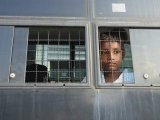

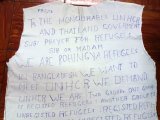
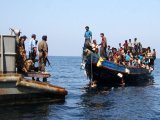

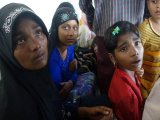
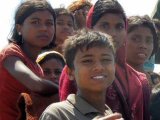

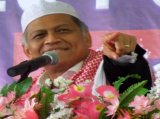
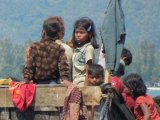
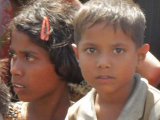



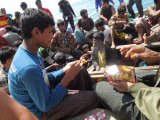
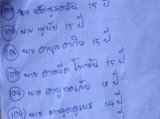




this may be comming to the mind of all over the world as complete surprise law for Rohingya people that they are crossing a deeply river to arrive a peacefully land where the government have a mercy namely Thiland and Malaysia .
Posted by allom on February 14, 2013 20:09